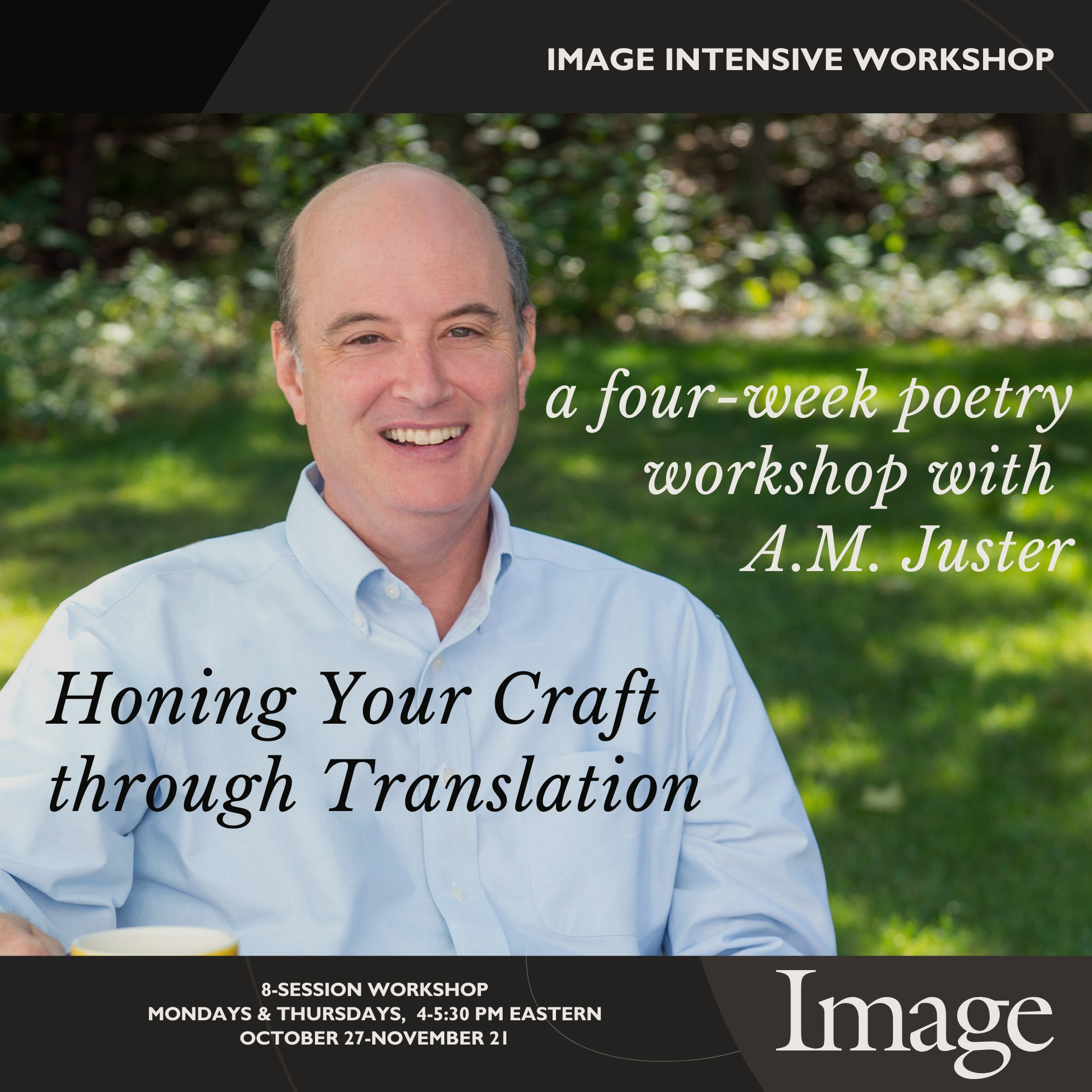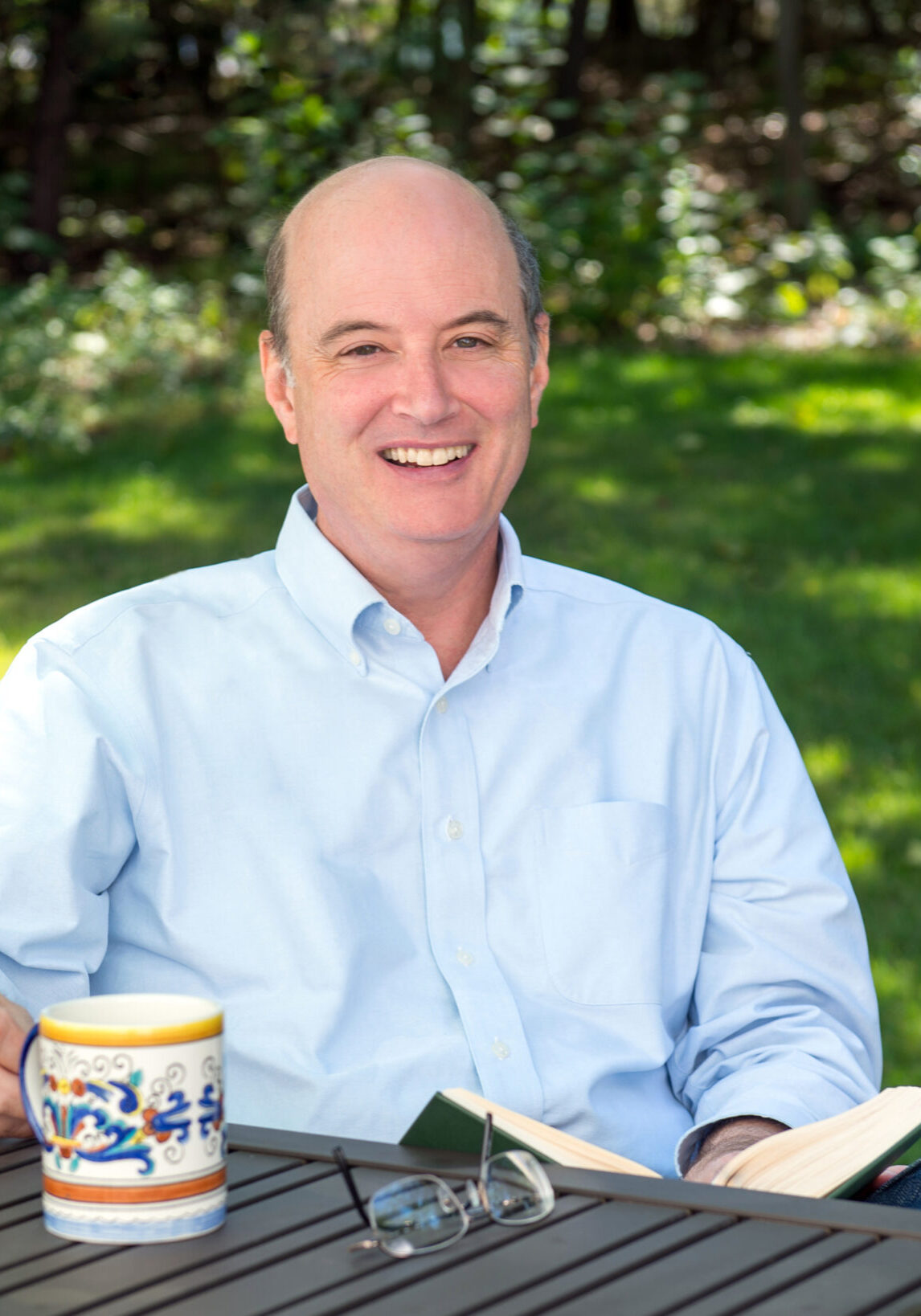
We are pleased to present an Image Intensive workshop with A.M. Juster!
Honing Your Craft through Translation
with A.M. Juster
An eight-session craft workshop on poetry
October 27-November 21
Mondays & Thursdays, 4-5:30 PM Eastern
We are pleased to announce another Image Intensive, an opportunity to dive deeper into your craft, guided by faculty from our community who understand the unique impulses and challenges facing artists at the intersection of art and faith.
From our facilitator, A.M. Juster:
I first tried my hand at translating poetry at 15. My Latin teacher, who later went on to be a star professor and administrator at the University of Texas-Dallas, required an independent study project. Since I had been reading a lot of Shakespeare in my English class, I decided to translate one of the assigned texts, the medieval epic Waltharius, into iambic pentameter. The project went well, but it was not a revelatory experience.
Two decades later I decided to teach myself how to write formal poetry by translating short famous works into meter and rhyme. I compared my work with published versions, and started to feel I was getting good at it. Some top journals reinforced that opinion by accepting some of my translations before they started accepting my original poetry.
I picked up a solid reading knowledge of French and Latin in high school, and started studying new languages on my own; later I took classes in Italian, Middle Welsh and Old English at Tufts and Harvard. In 1999, at the urging of a future chair of the National Endowment for the Arts, I tried my first book-length translation project—and failed miserably. A few years later I finished my first book-length translation, Horace’s Satires (University of Pennsylvania Press 2007), and I was off to the races with five more books of translated poetry. During the pandemic I went back to and finished my first project, and so W.W. Norton will publish my translation of Petrarch’s Canzoniere in April of next year.
My goal is not to turn anyone in the class into a translator or a formal poet. My goal is to try to enrich your free verse with conversations and exercises that will probably take you out of your comfort zone.
Our literary establishment looks down on traditional prosody and has not developed an alternative. One might see praise heaped upon a seemingly random line break, but never criticism of a line break. Discussion of form seems restricted primarily to easy, gimmicky poetry-like creations, such as “found poetry” and “erasure poetry.” Syllabi include little poetry before 2000 and little outside of the US, Ireland, and the UK. “Finding one’s own voice” seems paramount, but that too often results in prosy summaries of daily life.
In this atmosphere many poets start to feel a bit lost and want to try something different but aren’t sure how to accomplish that goal. Prompts are a popular creative stimulus, but they still leave you working through what you want to say at the same time as you are wrestling with how to say it. Translation frees you from that burden and lets you focus on how to write with new techniques, in the voices of others, and on subjects that you never would have written about on your own.
Translation can also spare you from some of the angst of standard workshop critique. Although we will do some workshopping of exercises in the second half of classes, you will in many cases be able to compare your own work with the work of experienced translators, and you can make your own judgments as to how good your work is.
My experience, and my observation of the experiences of many others, is that a good-faith effort to practice translating poetry and use the techniques of traditional prosody can be a positive stimulus for one’s own work. Anne Sexton and Sylvia Plath were constantly being inventive with their poetic inheritance. Two of the stars of the 1960s and 1970s, Richard Hugo and Caroline Kizer, were taught in college by troubled formalist Theodore Roethke, and you can see Roethke’s influence throughout their work if you look carefully.
While it is always great to have fluency in other languages, it is not necessary for this course. I will provide you a prose “trot” for the exercises and suggestions as to how to go about your work.
Closer to the start of the class I will give you a schedule for the eight classes and a little information about our guest lecturers. I will aim to keep the classes moving briskly for ninety minutes and will let them run over a little if that seems worthwhile.
What to Expect:
In a small-group setting capped at 8 students, participants will experience:
- 90-minute sessions twice a week over four weeks.
- Classes led by a renowned formalist poet; world-class guest lecturers to be announced; opportunities to explore new forms and voices different from your own.
- In-depth feedback and editorial notes on one manuscript (up to six poems), to be reviewed by A.M. Juster outside of class.
This workshop is for poets of all levels. If you are seeking to learn more about formal poetry, hoping for a thorough review of your work, yearning for a compassionate writing community, or wishing for a supportive place to grow in your craft, this workshop is for you.
$895
This four-week seminar will be held on Zoom on Tuesdays and Thursdays from August 29-September 21.
About the Instructor
About A.M. Juster
In the June/July 2010 issue of First Things magazine, Paul Mariani revealed the identity of the person behind the pseudonym of New Formalist poet, translator and critic A.M. Juster.
A.M. Juster’s poetry, translations and essays have appeared in Poetry, The Paris Review, The Hudson Review,The New Criterion, Arion, North American Review, Rattle, Southwest Review, Barrow Street, Hopkins Review and many other publications. His thirteenth book, a translation of Petrarch's Canzoniere, is due in April of 2026 from W.W. Norton. His most recent books are a reconstruction of Aristophanes' lost comedy Gerytades from fragments in secondary sources and a throwback children's book called Girlatee.
The author is a graduate of Yale and Harvard Law School, and has accepted two honorary degrees. He worked for many years in the biotechnology industry and gained a reputation as an expert on rare diseases and as a chief executive officer who excelled at turning around troubled publicly traded companies.
He also had a long career in the federal government, where he worked in senior positions for four Presidents, twice in the White House. As General Counsel of the US Department of Health & Human Services, he was a co-architect of the first expedited drug approval regulations for the FDA, regulations which have improved the lives of millions of Americans. He also received national attention for successfully arguing in federal court the first patient dumping enforcement case and successfully trying the first federal HIV discrimination enforcement case.
As Commissioner of Social Security, the author overhauled the agency’s antiquated information technology infrastructure and upgraded its electronic services. As the creator of the agency’s “compassionate allowances” system and the implementer of other systems for improving the promptness and accuracy of the agency’s handling of disability claims, he received the Humanitarian of the Year Award from the Alzheimer’s Association, the VIDA Award of the National Alliance for Hispanic Health, the Public Health Leadership Award of the National Organization for Rare Disorders, the President’s Award of The Arc, Government Executive of the Year from Rare Disease Legislative Advocates, and other honors. He also wrote most of the scripts for the agency's highly regarded humorous public service announcements starring Academy Award winner Patty Duke, which can be found here.
About the Image Intensives
The Image Intensive series is aimed at fostering the growth of artists working at the intersection of art and faith. The Image Intensives offer an opportunity to dive deeper into your craft, guided by faculty from our community who understand the unique impulses and challenges facing artists at the intersection of art and faith.
FAQ
For additional questions, please email Image staff at image@imagejournal.org.





